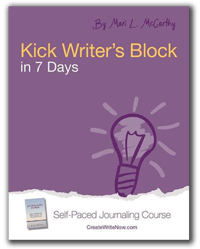 By Joan Herbert
By Joan Herbert
There may be times when you stumble upon the dreaded writer’s block. Whether you are a journalist, writing in a personal journal, a fiction writer, or an entertainment writer, it can happen at any time. You might just feel that you have nothing to say at all. Here are a few ways to unlock your voice and start writing again even when that feeling strikes.
Write what you’re looking forward to
This exercise is all about finding the positive. It’s been shown that people who spend time anticipating upcoming events are happier in general. Write down what you are looking forward to in the next weeks or months. If you don’t have anything coming up, write down what you would like to do and start planning it. This will give you a boost of positive energy and may help to unlock your mind a little. It also shows you that although you may feel you have nothing to say now, there is plenty coming up to be excited about.
Write your achievements
Have you achieved anything great lately? Have you made progress towards a long-term goal that you can be proud of? Have you written something that went well? Write down your achievements and detail the skills and techniques that helped you to succeed. This will show you where your natural abilities lie, and also reassure you that you still have them. The more you celebrate your achievements, the more motivation you will find to go out and make more.
Write your fears
Are you anxious about something at the moment? It might be the fact that you have nothing to say, or it might be something else that is worrying you. Write down anything that you are anxious or afraid about. This has a really cathartic effect and will make you feel a lot better about the things that you have to face. You will feel that the fears and worries you are facing are not as big as you thought you were. This can calm you down and help you to move on, finding your voice again.
Write an update
Another way to get your writing juices flowing is with a regular update on certain areas of your life. Pick things that are important to you. For example, you might write down what books you are currently reading, which film you saw most recently, which album by which artist you are enjoying the most, how far you have been going in your daily run, and so forth. Having these daily or weekly updates written down helps you to see how your life is progressing, and allows you to take control of your life. By choosing the things you care about, you ensure that your focus is not misplaced. This is a fantastic way to rejuvenate yourself and get your life going in the right direction.
Be visual
When words just won’t flow, try getting out of the funk by using pictures instead. A picture is worth a thousand words, so they say! Choose an image, and print it out, or paste it into your word processor if you are writing digitally. Now write about it. You could choose something that you have taken and write about why you took it, and what was going on around you. You could choose a random image and write what you feel about it or how it inspires you.
The most important thing to get you writing when you have nothing to say is simply – to write. It doesn’t matter what, and it doesn’t have to seem important or noteworthy. Just write!
About
Joan Herbert is an Assistant Manager at Bank-Opening-Times.co.uk, a curious individual, avid reader and a passionate creative writer.
If you want to learn how journaling can help you tackle life's challenges and address your feelings, please download the free eBook, The Journaling Guide to Manage The Stress and Strains of Life.
Need help conquering writer's block? Our self-paced journaling course, Kick Writer's Block in 7 Days, can help.



Leave Comment